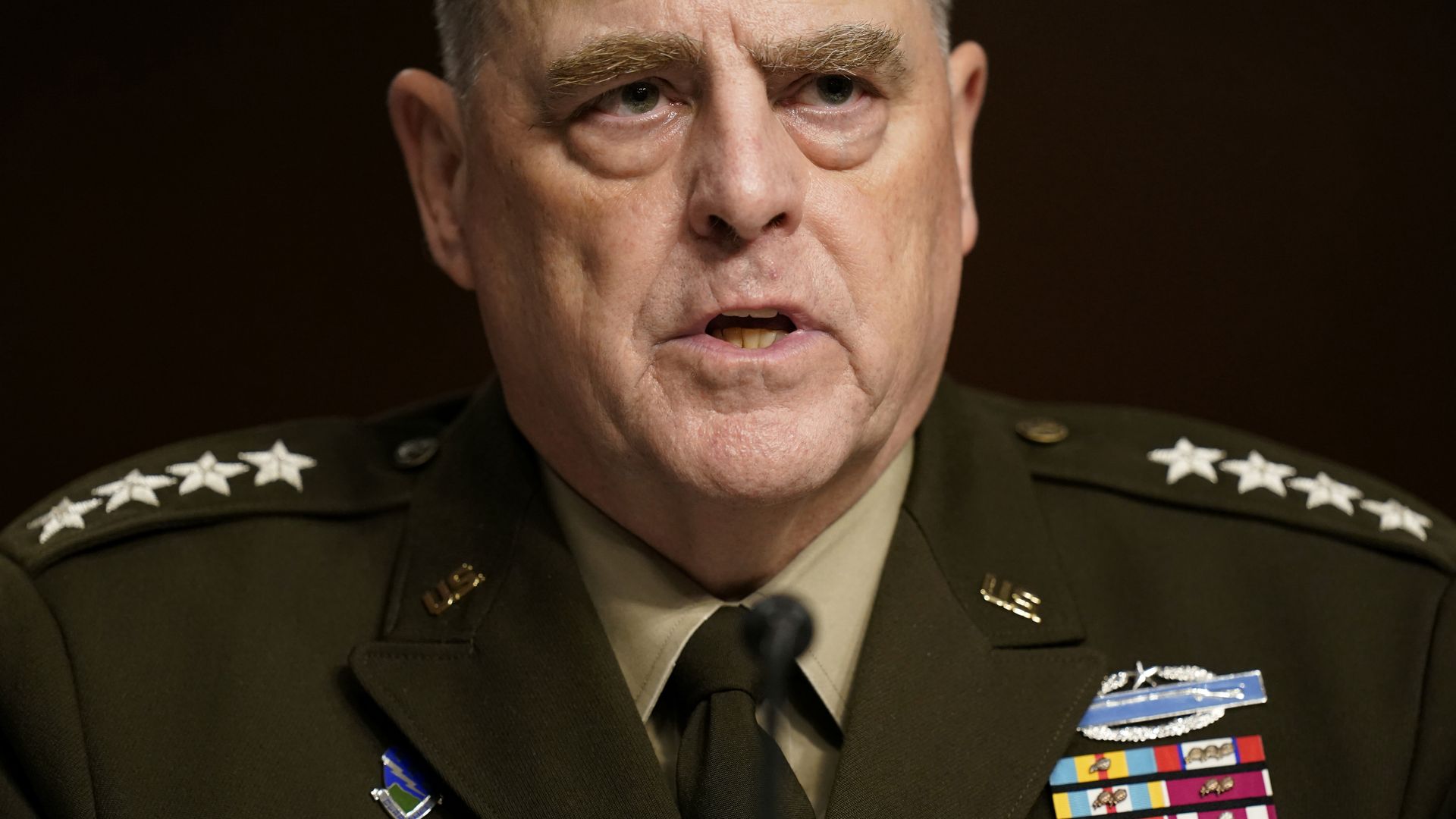Generals contradict commander
Add Axios as your preferred source to
see more of our stories on Google.

Joint Chiefs Chairman Gen. Mark Milley testifies on Tuesday. Photo: Patrick Semansky-Pool/Getty Images
President Biden sold his strategy for getting out of Afghanistan on uniformity of support. On Tuesday, the people in uniform contradicted him.
Driving the news: Joint Chiefs Chairman Gen. Mark Milley and Gen. Frank McKenzie, head of U.S. Central Command, testified they recommended keeping 2,500 troops in Afghanistan to prevent the collapse of Afghan security forces.
- Milley went a step further, suggesting the president shouldn't have put a date certain — Aug. 31 — on the U.S. withdrawal. "Make it conditions-based," the top U.S. general told senators during a newsy five-hour hearing alongside Defense Secretary Lloyd Austin.
Flashback: The question of whether Biden ignored the advice of his military advisers before the chaotic withdrawal from Kabul came up during a recent interview the president granted to ABC's George Stephanopoulos.
- "No, they didn't; it was split. That wasn't true," Biden said when asked whether Pentagon leaders recommended he keep a residual force in Afghanistan.
- The advisers didn't argue against pulling out all troops under a specific time frame, Biden insisted. "No one said that to me, that I can recall."
The contradictions from top Pentagon brass on Tuesday didn't stop there.
- "Al Qaeda is still in Afghanistan. They were there in mid-August," Milley said when asked about Biden's claim on Aug. 20 that the U.S. has no interests in Afghanistan now that the terrorist group was "gone."
- The outcome of the war was "a strategic failure," Milley said bluntly. "The enemy is in charge of Kabul; there's no way else to describe that."
- As to whether America’s credibility has been damaged, Milley said: "I think that our credibility with allies and partners around the world, and with adversaries, is being intensely reviewed by them to see which way this is going to go. And I think that 'damage' is one word that could be used, yes.”
- "The war on terror is not over, and the war in Afghanistan is not over," McKenzie testified, undermining the central message in Biden's address last week to the UN General Assembly.
For the record: White House press secretary Jen Psaki said Tuesday that Biden "values the candid advice" of his military advisers but that doesn't mean he always agrees with them.
- She also correctly noted the two generals, as well as Secretary Austin, testified that remaining in Afghanistan past Aug. 31 would have required an additional troop surge to fight the Taliban.
Between the lines: Despite Republican senators' success in drawing out tacit criticism of Biden, former President Trump arguably took worse blows.
- McKenzie told senators "the primary accelerant to lowering morale and general efficiency of the Afghan military" was the peace agreement the Trump administration negotiated with the Taliban.
- And Milley confirmed the Axios "Off the Rails" scoop that Trump ordered the full withdrawal of U.S. forces by Jan. 15 — undermining any suggestion that the ex-president favored a conditions-based exit from Afghanistan, unlike Biden.
The bottom line: Four presidents — not just the two who may face off again in the 2024 election — bear responsibility for the Afghan disaster.
